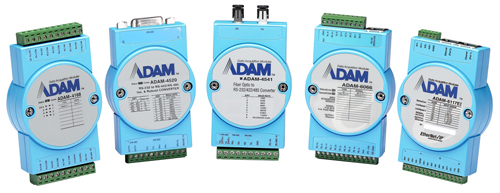In Part I of this three-part series, I discussed Determining Physical Interface. In this blog, I will address Supported Protocols in relation to each series available under the Advantech Remote I/O Module umbrella. This is an important area to address in order to gain a better understanding of the protocols available, while addressing the limitations of some of the modules.
Selecting the Correct Advantech Remote I/O Module
Tip 2: Supported Protocols
A. All Advantech ADAM-4000 modules support ASCII Command and/or Modbus/RTU.
- ASCII (American Standard Code for Information Interchange) is a standard code consisting of 128 7-bit combinations utilized for transmission between PCs.
- Modbus/RTU is an open serial 16-bit CRC (Cyclic-Redundant Checksum) protocol utilized due to its reliability. If you require Modbus, it’s important to reference the product data sheet to make sure the specific module in consideration supports it before you order.
B. The Advantech ADAM-6000, ADAM-6200 & WISE-4000 modules all support Modbus TCP, TCP/IP, UDP, HTTP & DHCP.
- Modbus TCP is merely a transportation protocol with its definition based solely on Modbus, which can move raw bits or words with little restriction and ease, while effectively communicating information to all devices on the same network. It’s probably the most popular among users, since it’s very easy to do.
- TCP/IP (Transmission Control Protocol/Internet Protocol) is utilized to connect hosts on the internet and combines the TCP and IP protocols to transmit data.
- UDP (User Datagram Protocol) is an alternative to TCP that can run on top of the IP protocol, establishing a low latency connection between applications to send datagrams.
- The HTTP (HyperText Transfer Protocol) is a World Wide Web protocol that executes each command independently without knowledge of previous commands sent. It is difficult to implement, which is why most utilize ActiveX, Java and JavaScript.
- DHCP (Dynamic Host Configuration Protocol) assigns dynamic IP addresses to each device on a network, which makes administration easier from a management perspective.
C. The Advantech ADAM-6100 modules are in league of their own, providing support only for Ethernet/IP & Profinet applications.
- Ethernet/IP is a combination of standard Ethernet and CIP (Common Industrial Protocol) protocols utilized to define features and functions of data transport along with the network, data link and layers involved.
- Profinet (Process Field Net) utilizes IEEE 802.3 wireless Ethernet and is utilized for discrete, motion, peer-to-peer and process functions, among others.
That’s going to wrap up Part II of Five Tips for Selecting the Correct Advantech Remote I/O Module. I hope that the information provided has been of some benefit to you. Stay tuned for Part III where I will address Analog/Digital, Input/Output and Number of Channels.
